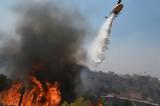Wildfires in Greece Spread Beyond Traditional Season
Greece is witnessing a troubling transformation in its wildfire patterns.
Over the past 25 years, fires during the official summer fire season have decreased in number — but they are becoming significantly more destructive.
Meanwhile, wildfires outside the traditional season, particularly in winter and spring, are quietly but steadily
Recent analysis by the fire meteorology group FLAME reveals that from 2000 to 2024, the average number of annual wildfires during the summer months dropped from roughly 4,300 to 3,700. But this decline masks a deeper problem. The total area burned each year has been growing, with an additional 600 hectares (about 6,000 stremmata) scorched annually.
When fires escape initial containment, they now tend to escalate uncontrollably. Fires larger than 2,000 stremmata — though representing just 0.5% of incidents — are increasing in frequency and in size. Greece is not just facing more large fires; it's facing mega-fires that are growing in scale.
This escalation may reflect worsening climate conditions, but it also raises serious questions about the country’s firefighting capabilities. When early suppression fails, the system appears to struggle with keeping fires in check.
What’s more concerning is what’s happening outside the summer season. Since 2012, winter and spring fires have increased by nearly 50%, both in number and in the total area burned. The fire calendar is shifting, but the country’s prevention and response strategies remain rooted in the past. Fires that once would have been unthinkable in colder months are now becoming routine.
Geographically, the pattern is also changing. While summer fire starts are declining in many regions, some areas — particularly in northern Greece, which has historically seen less fire activity — are experiencing a rise. Out-of-season fires, however, are becoming widespread across the entire country, including places never previously considered at risk.
Despite the growing crisis, key gaps in data are limiting Greece’s ability to respond. The official fire data, while valuable for tracking trends, lacks critical details. Authorities do not record the causes of fires, making prevention efforts speculative.
Information about how fires spread, how fast they move, and under what conditions is missing. Even spatial data is outdated, categorized by obsolete administrative regions, preventing detailed analysis of local risk factors.
This is not just a Greek issue. As the Mediterranean basin faces increasing fire risks due to climate change, Greece offers a warning — and a lesson. Fire seasons are evolving, fire behavior is changing, and conventional systems are no longer enough.
#ENGLISH_EDITION #GREECE #WILDFIRE- Δημοφιλέστερες Ειδήσεις Κατηγορίας Ειδήσεις
- Παγκόσμια ανησυχία για τον «πυρετό της κοιλάδας»: Διπλασιάστηκαν τα κρούσματα της νόσου στις ΗΠΑ
- «Δεν καθόμουν για 5 μέρες πουθενά και μεταμορφώθηκε το σώμα μου» – Δείτε πώς έγινε το σώμα του 26χρονου
- Συντάξεις: Μπόνους έως 350 ευρώ μηνιαίως – Ποιους αφορά και πώς υπολογίζεται η προσαύξηση
- Έκανε λάθος ο εφέτης ανακριτής;
- Όταν ο Πάπας Λέων ΙΔ' συνάντησε τον Θανάση Βέγγο
- Νέα Σμύρνη: Τα πρωτοφανή επεισόδια – Ο ξυλοδαρμός του 34χρονου συλληφθέντα
- Άγχος: «Σκότωσέ» το με μια μόνο κίνηση το πρωί
- Πότε συμφέρει η σύνταξη με πλασματικά έτη
- Μάριος Καπότσης: Το κράτησε κρυφό – Σε σχέση με 25χρονη εδώ και λίγους μήνες
- Όταν ο Πάπας Λέων 14ος συνάντησε τον Θανάση Βέγγο στην Κολομβία
- Δημοφιλέστερες Ειδήσεις Dikaiologitika
- Οι τελευταίες μέρες του ναζισμού - Τα μεγάλα γεγονότα
- Ελλάδα - Αίγυπτος: Η επικράτηση του πολιτικού ρεαλισμού
- Επιστολή στον Τραμπ από μέλη του Κογκρέσου για τον Ερντογάν, την Ελλάδα και τα F35
- Ογδόντα χρόνια μετά ο φάκελος «γενικευμένη διεθνής πολεμική σύγκρουση» βγαίνει από το χρονοντούλαπο
- Φορολογική Μεταρρύθμιση ή ικανοποίηση δημοσκοπικών «αναγκών»;
- Γιάννης Κωνσταντινίδης: Μια πολύ ενδιαφέρουσα έρευνα για το ΠΑΣΟΚ
- 80 χρόνια μετά: Το τέλος του κόσμου που γεννήθηκε από τον Β Παγκόσμιο Πόλεμο
- ΣΥΡΙΖΑ - Κασσελάκης: Περασμένα μεν, ξεχασμένα όχι
- Εορτολόγιο 2025: Γιορτή και σήμερα, σε ποιους να ευχηθείτε
- 1Γ/2025 ΑΣΕΠ - Το Τεστ που δεν μετράει Γνώσεις αλλά Συμπεριφορές

- Τελευταία Νέα Dikaiologitika
- Wildfires in Greece Spread Beyond Traditional Season
- Athenian Hotels See Strong Start to 2025 with Rising Occupancy and Revenue
- Final Testing Nears Completion for Crete-Attica Power Interconnection Project
- Greece's Water Infrastructure Nears Breaking Point
- Πάπας Λέων: Τα τρία στοιχεία που δείχνουν τον δρόμο που θα ακολουθήσει ο νέος ηγέτης των Καθολικών
- 1Γ/2025 ΑΣΕΠ - Το Τεστ που δεν μετράει Γνώσεις αλλά Συμπεριφορές
- Καιρός: Αφρικανική σκόνη, βροχές και 32άρια σήμερα
- Εορτολόγιο 2025: Γιορτή και σήμερα, σε ποιους να ευχηθείτε
- Επιστολή στον Τραμπ από μέλη του Κογκρέσου για τον Ερντογάν, την Ελλάδα και τα F35
- 80 χρόνια μετά: Το τέλος του κόσμου που γεννήθηκε από τον Β Παγκόσμιο Πόλεμο
- Τελευταία Νέα Κατηγορίας Ειδήσεις
- Αλλάζει ο καιρός: Πτώση της θερμοκρασίας, βροχές και καταιγίδες - Η πρόγνωση Μαρουσάκη
- Σόφη Ζαννίνου: «Είχα πολλές κόντρες με τον πατέρα μου, ήμουν σαν μητέρα για τη μαμά μου»
- Καιρός: Ζέστη και μικρή αλλαγή με βροχές σήμερα
- Λευκός Πύργος γκράφιτι: Μια πράξη ασέβειας
- Πάπας Λέων ο 14ος: Το βιογραφικό του νέου ποντίφικα
- Ένοπλη ληστεία σε ψητοπωλείο στο Αιγάλεω
- Εντός της ημέρας η πρώτη λειτουργία του Πάπα Λέοντα ΙΔ' - Τα πρώτα του βήματα ως νέου Ποντίφικα
- Από Boeing μέχρι σύριγγες στα αντίμετρα της Κομισιόν
- Θεσσαλονίκη: Ασυνείδητοι έβαψαν με κίτρινη μπογιά τον Λευκό Πύργο



